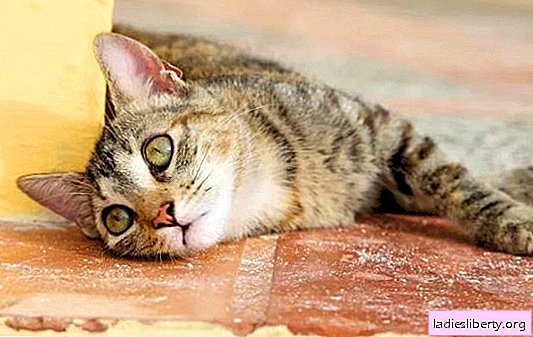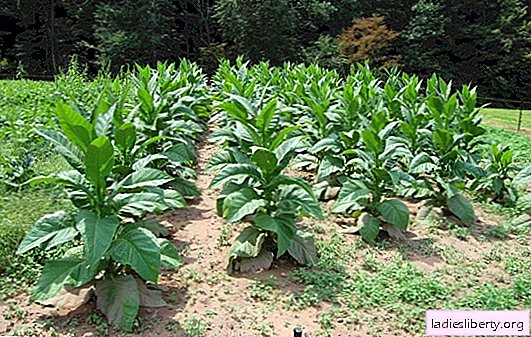
A small kitten is much more likely to be poisoned by toxic substances than mature cats, because their body is still quite weak and does not tolerate the negative effects of harmful substances.
A cat, akin to a small child, often pulls all the bases into the mouth for analysis, not realizing that this could harm him. When this happens, the owners immediately ask themselves what to do, the kitten was poisoned, what should be done in such a situation? The following material will be devoted to this question.
The kitten was poisoned: signs, causes
In order to find out what happened to the pet, you first need to determine what factors can be the reasons for his poor health. The list of the most likely causes is as follows:
1) contact with household chemicals containing corrosive concentrated substances. Often animals do not tolerate pungent odors, but not all substances have them. For example, ethylene glycol, which is present in antifreezes, has a sweetish taste and can be pleasant for little pets. So, only 1 mm of antifreeze will be enough for him to poison;
2) insect repellents and ticks. These poisons are able to exert action through the skin. A kitten can be poisoned due to improper use of flea remedies. So, for kittens up to 4 months old, it is undesirable to use strong insecticides. In this case, it is better to use a special shampoo for kittens or comb out the fleas in manual mode. Also, be careful when processing the premises, because pets can get poisoned from insecticide residues;
3) poisons from rats and mice: a kitten can eat bait or a rodent that has died from the poison;
4) some houseplants can be irritants and cause inflammation of the skin by contact or poisoning in the case of eating pet leaves;
5) poorly hidden drugs in the medicine cabinet;
6) if the animal can calmly walk along the street, poisoning may occur in contact with other substances;
7) fumes of petroleum products pose a great danger to kittens; they can not only irritate the nasal mucosa, but also cause serious poisoning;
8) wild poisonous plants can also cause poisoning of the animal;
9) all preparations for weeds and pests contain many harmful chemicals.
As for garbage poisoning, cats are much less likely to be affected by this, since they are very picky in food, but this is still a possibility.
If you have symptoms of poisoning a kitten, you can’t hesitate, immediately take him to a veterinary clinic! Thus, the veterinarian will immediately be able to examine him and find out what is the reason. Also grab the drops that provoked the poisoning, so the doctor can study the composition and figure out what the problem is. Remember, you can not self-medicate or drag out with a trip to the veterinarian, this can be fatal.
Kitten poisoned: symptoms
The symptoms of kitten poisoning can vary significantly depending on many factors. The most characteristic symptoms are:
- salivation;
- lack of appetite;
- lethargy;
vomiting
diarrhea
- impaired coordination of movements;
- overexcitation;
- cramps;
- dilated pupils.
Do not forget, kittens react very sharply to any changes in the body, so if you have any symptoms, you should not delay the resolution of the problem.
Kitten poisoned: signs
With most food poisoning in small kittens, diarrhea and vomiting occur as natural defensive reactions. With most food poisoning in a kitten, diarrhea and vomiting develop as a natural defensive reaction.
However, you must be aware that these signs are characteristic not only in case of poisoning. For example, vomiting can also occur with some infectious or non-communicable diseases of the gastrointestinal tract. In acute forms of poisoning, sharp onset of symptoms is characteristic, the temperature may be normal or lowered.
If serious signs of the disease occur, you should immediately take it to your veterinarian to provide professional assistance to your pet. However, any person will be able to provide the necessary first aid to his pet himself.
What to do: kitten poisoned, first aid
It often happens that a veterinarian does not have the opportunity to quickly get to a sick pet and provide him with emergency medical care. In this case, you do not need to hesitate, so immediately after notifying the veterinarian, you should immediately begin to take the necessary measures to assist your pet. In such difficult situations, animals are always malleable and allow the owners to do all the necessary procedures, because they completely trust them.
In cases where the baby is poisoned after contact with poisonous drops from fleas, it is first necessary to wash his coat with warm water with baby shampoo and soap, this will quickly remove all residues of toxic substances.
Then you need to do a procedure to release his stomach, that is, cause a gag reflex. To do this, you can use the method suggested below. However, this procedure should be carried out very carefully in order to avoid causing harm to the animal.

So, to induce vomiting, you should prepare a solution that will be poured into the kitten's mouth with a teaspoon or syringe without a needle:
1) a weak solution of potassium permanganate;
2) saline solution (1 teaspoon of salt in 0.5 cups of water);
3) 3% hydrogen peroxide solution (calculation of 0.5 teaspoon per 1 kg of pet weight).
Now you know for what reasons poisoning can occur in a kitten and how to act if it happened. Take care of your pets, and they will answer you with their endless love!











